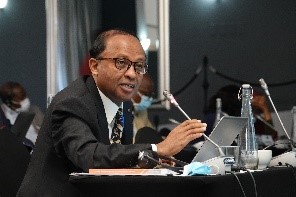
The African Society for Laboratory medicine (ASLM) and Africa Centres for Disease Control and Prevention (CDC) convened 70 participants from 14 African countries to a 5-day workshop from the 30 May to 3 June 2022, to introduce the National Laboratory Quality Framework (NLQF). This event was facilitated by a team of ASLM experts assisted by DATOS, as part of the EQuAFRICA Fleming Fund and UK Aid regional grant, an ASLM-led collaboration with Africa CDC, National Institute for Communicable Diseases, Public Health England, Institut Pasteur de Dakur, Technical University of Denmark, and Amref Health Africa. The lack of policy and regulatory infrastructure enabling the implementation of laboratory quality management system (QMS) through entire laboratory networks, has been identified as a critical bottleneck to transform quality activities (such as participation in external quality assessment (EQA)) into sustainable laboratory improvement and impact on patient and public health outcomes. Given this, the NLQF was designed by ASLM, Africa CDC and DATOS, as a comprehensive guidance, which countries can use to develop national laboratory quality policies and/or strategic plans.
 ‘It is time to rethink the implementation of QMS from a facility perspective to a laboratory network perspective,’ said Mr Nqobile Ndlovu, CEO of ASLM, ‘and structure this implementation around robust national quality policy and strategic plans’. He continued, ‘ensuring that QMS is implemented in every laboratory or testing facility in a country is the only way to ensure that every patient everywhere has access to the right test, with the correct result, at the right time and at the right place.’
‘It is time to rethink the implementation of QMS from a facility perspective to a laboratory network perspective,’ said Mr Nqobile Ndlovu, CEO of ASLM, ‘and structure this implementation around robust national quality policy and strategic plans’. He continued, ‘ensuring that QMS is implemented in every laboratory or testing facility in a country is the only way to ensure that every patient everywhere has access to the right test, with the correct result, at the right time and at the right place.’
 Dr Aytenew Ashenafi, representing the Laboratory Division of Africa CDC, added that ‘Africa CDC supports this initiative. Advancing laboratory quality through the establishment of national quality standards and a systems approach aligns with the laboratory network pillar of Africa CDC and contributes to achieving the targets of UHC and the requirements of IHR.’
Dr Aytenew Ashenafi, representing the Laboratory Division of Africa CDC, added that ‘Africa CDC supports this initiative. Advancing laboratory quality through the establishment of national quality standards and a systems approach aligns with the laboratory network pillar of Africa CDC and contributes to achieving the targets of UHC and the requirements of IHR.’
We congratulate the 14 country teams assisted by six Directors of Laboratory, who have debated and reached consensus during these five days, to assess their national QMS implementation strategies, and developed roadmaps to strengthen their national laboratory quality policies and/or strategic plans.
 ‘This was an eye opener’, said Dr Ngoné Déguène Samb, Chef de la Division Reseau National des Laboratoires, Le Ministère de la Santé et de l’Action Sociale, Senegal. ‘We thought we were addressing laboratory quality in our country,’ she continued, ‘but I realize now that our approach was not providing the necessary support systems to enable the laboratories to achieve the quality requirements.’
‘This was an eye opener’, said Dr Ngoné Déguène Samb, Chef de la Division Reseau National des Laboratoires, Le Ministère de la Santé et de l’Action Sociale, Senegal. ‘We thought we were addressing laboratory quality in our country,’ she continued, ‘but I realize now that our approach was not providing the necessary support systems to enable the laboratories to achieve the quality requirements.’
Dr Ashenafi says, ‘The work is starting now!’
In the coming months, ASLM and Africa CDC will continue to provide the high level advocacy to facilitate the completion of this first ‘batch’ of national quality policies. We are eager to engage more partners and leverage on the AMR (AMR CoP) and Laboratory System Strengthening Communities of Practice (LabCoP) to provide our technical assistance to the country teams. Moving forward, ASLM and Africa CDC call upon countries, stakeholders and funders to support the development and implementation of national laboratory quality policy across the 55 AU member states. Read the full NLQF Guidance here.
Author: Dr Pascale Ondoa and Beatrice Puije
Editor: David Lewin
About ASLM
Established in 2011, the African Society for Laboratory Medicine (ASLM) is a pan-African professional body focused on improving healthcare by strengthening all aspects of laboratories including workforce strengthening, quality improvement and accreditation, regulation(s) harmonization, networks strengthening, and advocacy and communication strengthening. Laboratory testing is pivotal for disease diagnosis, epidemiological surveillance, outbreak investigation, and treatment initiation and monitoring, as well as research and development. ASLM addresses these challenges by working collaboratively with governments; national, regional and international organizations; implementing partners; the private sector; and other agencies to achieve its strategic vision goals. ASLM is endorsed by the African Union with support from the World Health Organization, Africa CDC, the US CDC, the US President’s Emergency Plan for AIDS Relief, the World Bank, the Clinton Foundation, UNAIDS, and others.
